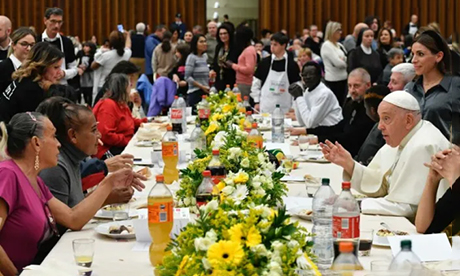In a significant gesture towards inclusivity, Pope Francis extended a lunch invitation to a group of transgender individuals.
The group, mostly Latin American migrants and often engaged in sex work, has received unprecedented support from the Vatican.
Under the guidance of the local parish priest, Rev Andrea Conocchia, these women now attend Francis’ weekly audiences as VIP guests.
Recently, the group joined over 1200 other underprivileged individuals as guests for a special lunch at the Vatican, commemorating the Catholic Church’s World Day of the Poor.
For these marginalised women, these gestures signify a newfound sense of inclusion within a church that historically kept them at arm’s length.
Transgenders feel more human
“Before, the church was closed to us. They didn’t see us as normal people. They saw us as the devil” said Andrea Paola Torres Lopez, a Colombian transgender woman. “Then Pope Francis arrived, and the doors of the church opened for us.”
Claudia Victoria Salas, 55 and Carla Segovia, 46, both sex workers from Argentina, attended the lunch.
To her surprise, Salas found herself seated at the main table opposite the pope – who of course is also Argentinian.
“We transgenders here in Italy feel a bit more human because the fact that Pope Francis brings us closer to the Church is a beautiful thing” said Carla Segovia.
Francis’ latest initiative was a document from the Vatican’s doctrine office asserting that, under some circumstances, transgender people can be baptised. It also allows them to serve as godparents and be witnesses at weddings.
Polarised opinions
However the Catholic Church hasn’t universally accepted Francis’ stance on inclusivity. Conservative factions and some clergy members have challenged his approach, highlighting the polarised opinions within the Church.
For Canocchia, Francis’ response to Salas and the others has changed him profoundly as a priest. It has taught him the value of listening and being attentive to the lives and hardships of his flock.
For the women, it is simply an acknowledgement that they matter.
“At least they remember us, that we’re on Earth and we haven’t been abandoned and left to the mercy of the wind” said Torres Lopez.
